I miss the days of the early web when most things online felt legit—back before the proliferation of bots and generative AI. The modern web has drastically changed, and it feels like “fake” content now outnumbers genuine content. You can’t trust anything anymore, especially when it comes to reviews on product sites.
Whether you’re on Amazon, Yelp, Google, or some brand’s first-party online shop, you need a skeptical eye when reading reviews. Companies have been known to filter out negative reviews, pay for positive reviews, and manipulate how reviews are shown. The problem has gotten so bad that the FTC began cracking down on fake reviews last year.
As someone who’s been burned by fake reviews in the past, I’ve learned to identify some of the suspicious red flags inauthentic reviews often have. Here’s what I look for and what you should avoid.
Generic language with no specifics
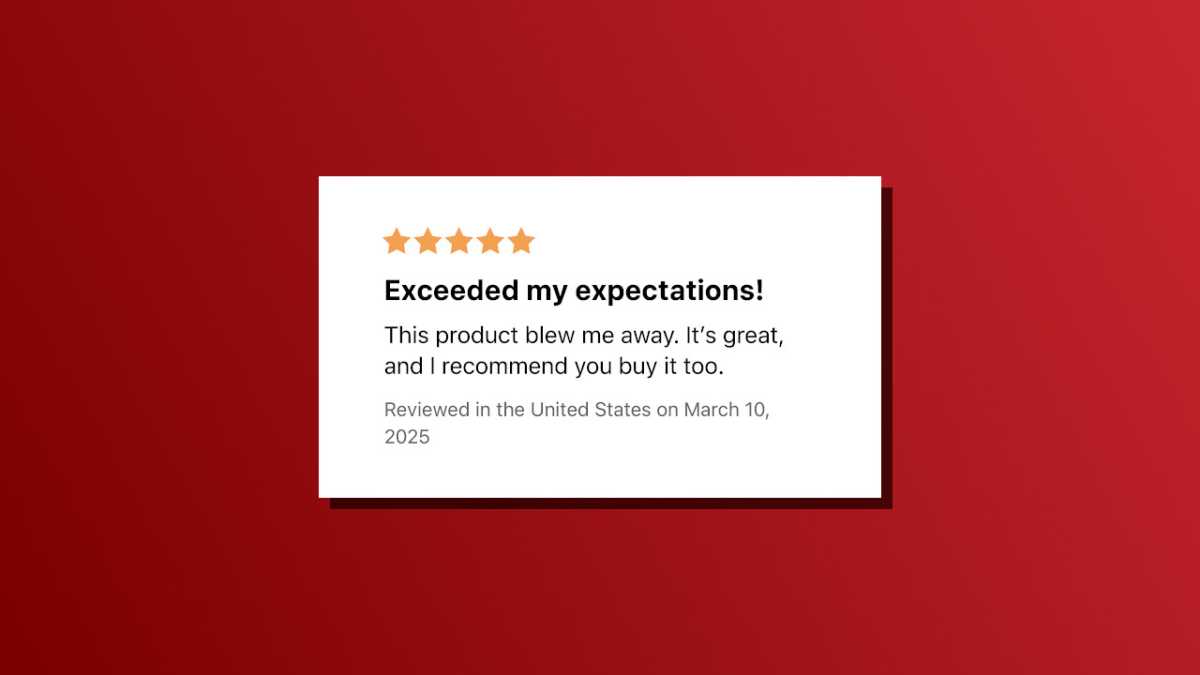
Dave Parrack / Foundry
The first telltale sign of an online review that deserves no weight is when it uses nothing but generic language. Genuine reviews normally include concrete details, real experiences, and emotional language (whether good or bad). Generic and non-specific language may not necessarily be fake, but it’s worthless nonetheless.
Phrases to look out for include “great product” or “works perfectly” without actually expounding on why the product is good or how it works well. Where are the details of the buyer’s experience? How did they use it? Were their expectations met or unmet? Are there any drawbacks they ran into? Or surprises that they discovered?
If you don’t get anything deeper than bland and nondescript words, that’s a good sign to discard that review and move on.
No mention of the product
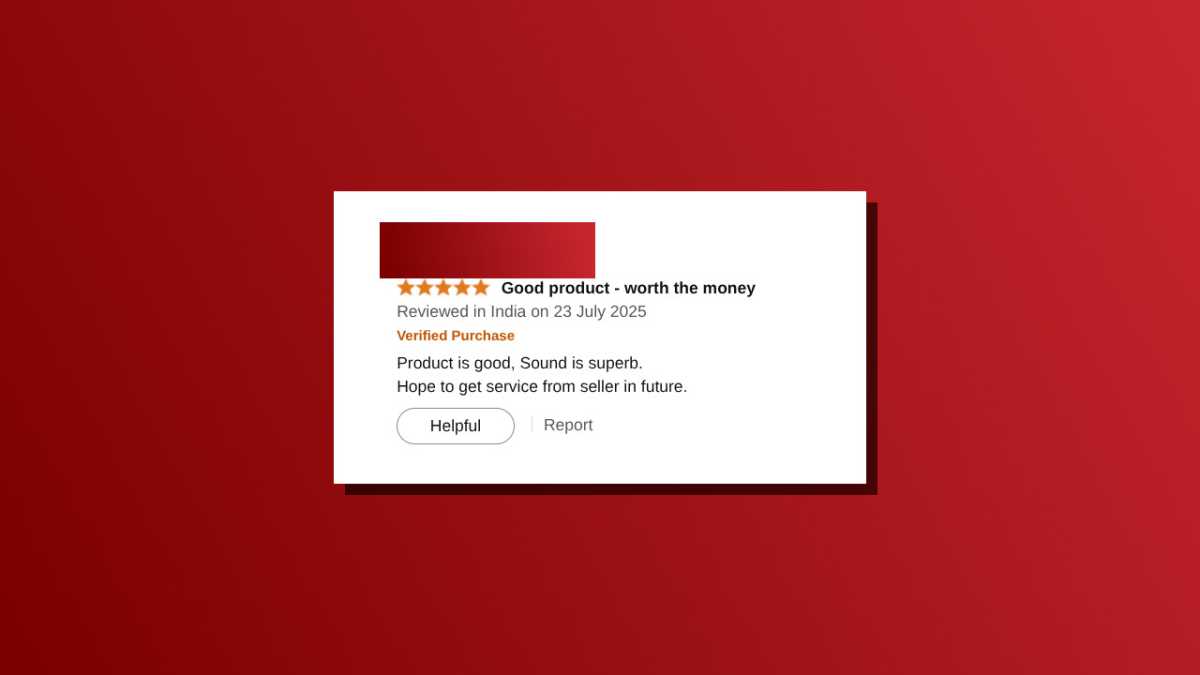
Dave Parrack / Foundry
One big red flag that makes me question any fake review is when it doesn’t mention even mention the product being reviewed. This is sort of like the first point, but not quite the same. Let me explain.
The review might be well-written and full of “personal experience” with the product, but if the product is never named, then you can’t be sure if they’re talking about the same thing. Maybe it’s fake, maybe it’s copy-pasted, or maybe it’s for another product. (Amazon products have been known to recycle product IDs, such that the product page changes but still keeps all the reviews that were made for the previous product.)
Of course, it could swing to the other extreme as well. If the review names the product as “Apple EarPods Headphones with Lightning Connector, Wired Ear Buds for iPhone,” then you should be skeptical of its authenticity. Real people don’t write like that. “Apple EarPods” is more than enough to identify the product.
Repeat phrases on multiple products
This red flag is harder to spot because you have to click into a reviewer’s profile and see their past reviews. But if a particular review sounds fishy, this can be something worth trying.
A reviewer who repeats the same phrases across multiple products is highly likely to be faking it. At best, it means they don’t have any unique insights to offer, thus making their review less valuable. At worst, they’re just copy-pasting the same text on everything, which may not reflect their actual thoughts. Or they might be batch-reviewing a bunch of products they’ve barely tested. Who knows?
For a review to be worth its salt, it needs to be a personal account of someone’s real, lived-in experience. Even if you actually bought and reviewed a handful of gaming mice, how likely is it that you’d reuse the same exact phrases in all of those reviews? If you’re reviewing in good faith, you’d have specific likes and dislikes about each one.
Hyperbolic expressions
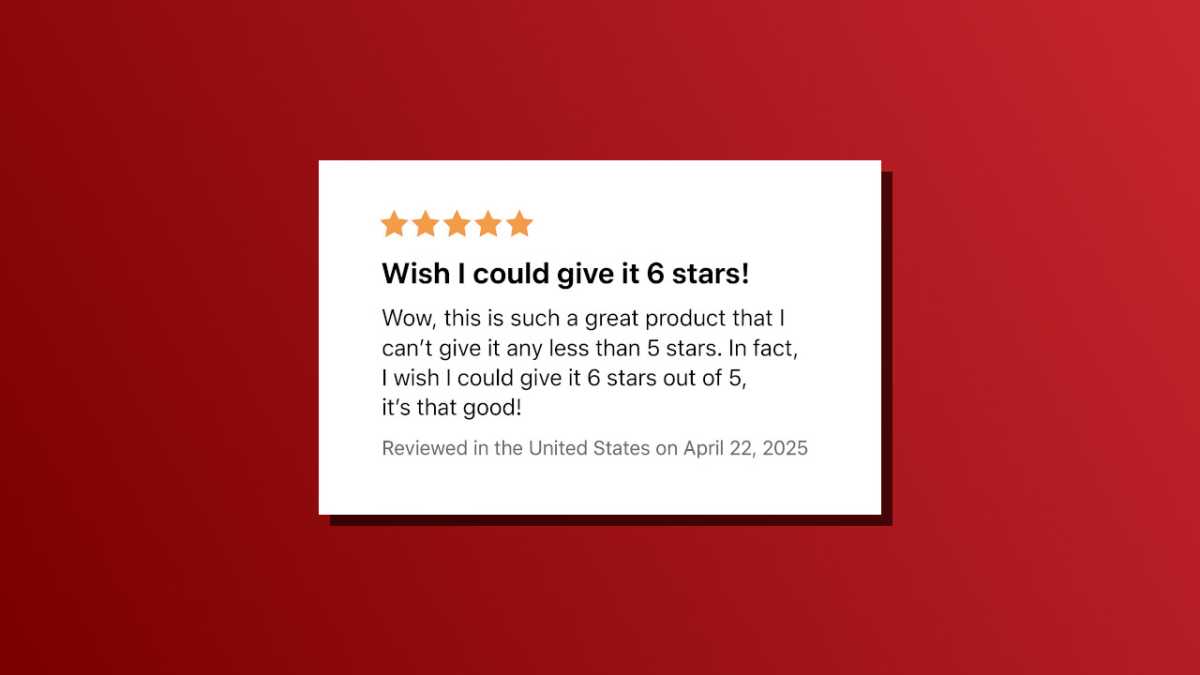
Dave Parrack / Foundry
Any review that gushes with non-stop positivity and has nothing but good things to say should be suspect, especially when the praise is cranked up to 11 and feels more like an ad than a review.
Even the most satisfied users should have some dislikes or peeves or caveats or warnings to offer. If someone’s way too cultish about their love for a product, it calls into question whether they’re actually offering a balanced, helpful, authentic review. If it sounds too good to be true, it usually is—and that’s absolutely true for reviews as well.
You’ll have to trust your gut on this one because some people are naturally enthusiastic and only focus on the positives, but those who are like this and genuine are rare in the world of online reviews. And if you spot any of the other red flags, you should definitely be wary.
5-star reviews all posted on the same date (or over a few short days)
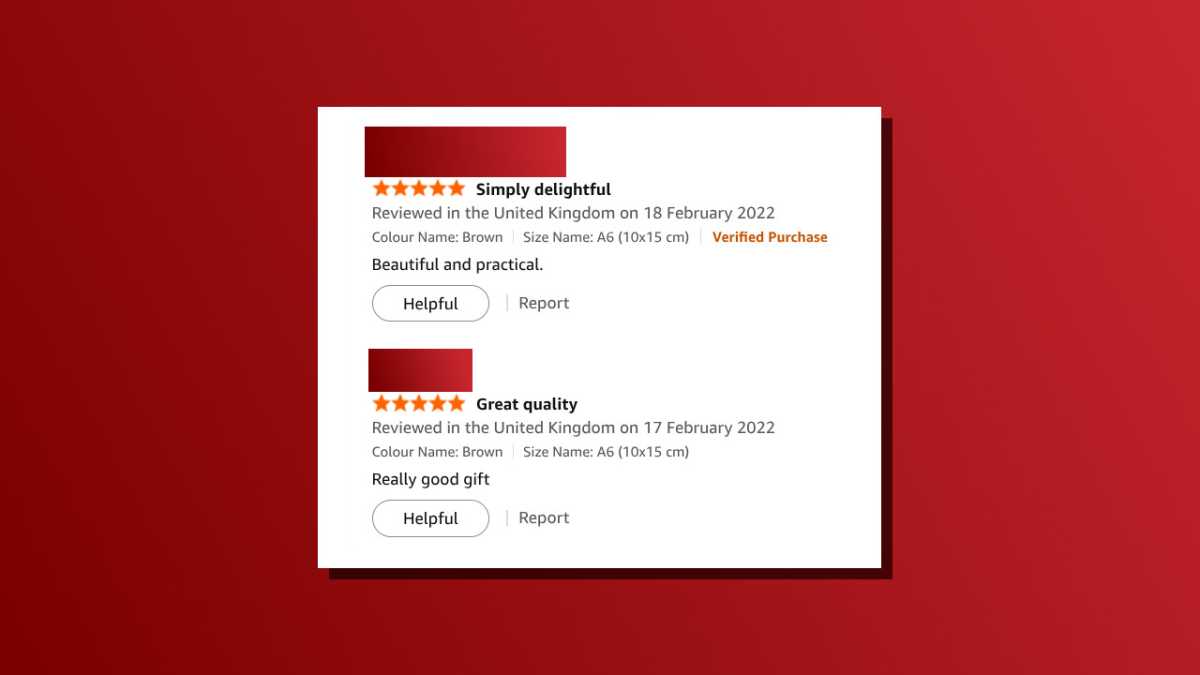
Dave Parrack / Foundry
If you’re like me, you probably buy way too many products online… Yet even so, you’re unlikely to have purchased so many products in such a short span of time that you can leave tons of 5-star reviews on the same day. It’s one thing to go through all your past purchases and review them in one go, but another to give everything 5 stars.
And yet that’s exactly what some people appear to do once you open up their review histories and see what they’re handing out. If someone only gives out 5-star ratings, it suggests they aren’t putting much thought into their scores—or in the worst case, they might be being paid or rewarded for their artificially high scores.
Similarly, if a product has a ton of 5-star reviews posted on the same day (or a span of a few days), it could be a sign that someone has bought reviews for that product. Be on the lookout for that.
1-star reviews are just as problematic
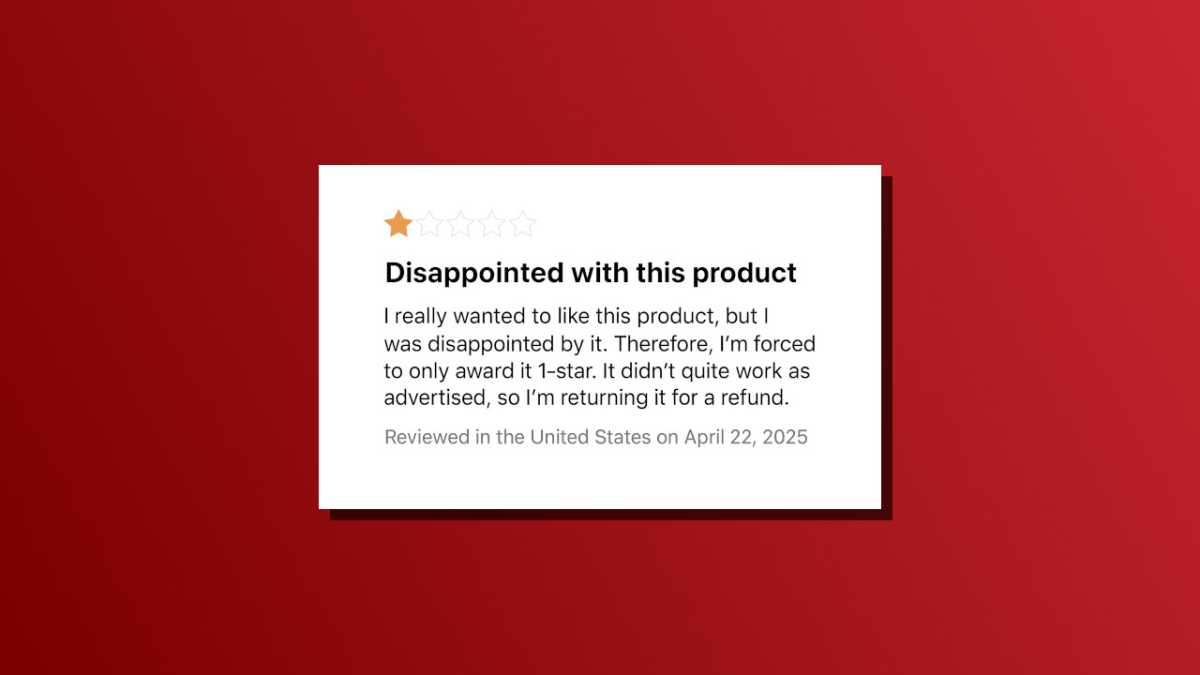
Dave Parrack / Foundry
If someone has a couple of 1-star reviews mixed in their history, that’s a sign of authenticity. But not all 1-star reviews are equal. Someone who has tons of 5-star reviews mixed with 1-star reviews could be using those 1-star reviews to throw you off their scent.
This may sound odd, but it’s true. As users like you and me try to sniff out fake reviews, the fake reviewers are also figuring out tricks to beat detection—and this is one of them. Sprinkling in the occasional legitimate review makes their fake reviews seem more real, and you need to be aware that people out there are using tricks like this.
Meanwhile, if a product has tons of 1-star reviews, you should be skeptical of those as well. Not only do people give out 1-star ratings for all sorts of stupid reasons, but rival companies sometimes pay for negative reviews to bring down their competitors. Both 5-star and 1-star reviews deserve scrutiny, especially on marketplaces like Amazon.
New accounts with no activity
A review posted by a new account isn’t hard evidence that it’s fake, but it’s a good sign to be cautious. In the same way that an Uber driver is more likely to accept your ride request if you have an established history, you should be more willing to believe reviews from people who have a history of writing real, helpful, authentic reviews.
The simple fact is this: a new account could be anyone. It could be a paid reviewer. It could be a competitor who wants to smear their rival. It could be a ticked off consumer who’s on a warpath. Or it could be employees trying to prop up their own products and services.
Regular reviewers who have a nice mix of opinions are much more likely to be real humans with hands-on experiences of the products you’re looking to buy. Research the reviewers you’re choosing to trust as well as the products you’re looking to buy before checking out.
Further reading: Stop being tricked by AI fakery! Spot these red flags
This articles is written by : Nermeen Nabil Khear Abdelmalak
All rights reserved to : USAGOLDMIES . www.usagoldmines.com
You can Enjoy surfing our website categories and read more content in many fields you may like .
Why USAGoldMines ?
USAGoldMines is a comprehensive website offering the latest in financial, crypto, and technical news. With specialized sections for each category, it provides readers with up-to-date market insights, investment trends, and technological advancements, making it a valuable resource for investors and enthusiasts in the fast-paced financial world.
